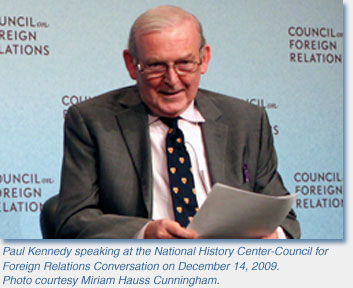From the National History Center
Paul Kennedy Dissects the Sinews of Power at NHC-CFR Conversation in New York
 In the fifth of a series of conversations jointly sponsored by the National History Center and the Council for Foreign Relations (CFR), Paul Kennedy, the Dilworth Professor of History and director of international security studies at Yale University, spoke on the topic, “The Sinews of Power: Rediscovering the Foundations of National Strength” to an overflow crowd at the CFR’s premises in New York City on December 14, 2009. The audience included Wm. Roger Louis, the director of the National History Center, Arnita A. Jones, executive director of the American Historical Association, and Miriam Hauss, the assistant director of the National History Center, as well as several distinguished academics and public figures from the New York City area.
In the fifth of a series of conversations jointly sponsored by the National History Center and the Council for Foreign Relations (CFR), Paul Kennedy, the Dilworth Professor of History and director of international security studies at Yale University, spoke on the topic, “The Sinews of Power: Rediscovering the Foundations of National Strength” to an overflow crowd at the CFR’s premises in New York City on December 14, 2009. The audience included Wm. Roger Louis, the director of the National History Center, Arnita A. Jones, executive director of the American Historical Association, and Miriam Hauss, the assistant director of the National History Center, as well as several distinguished academics and public figures from the New York City area.
The idea behind the series was, as Richard N. Haass, the president of the CFR, put it in his welcoming remarks, “to welcome distinguished historians to the Council on Foreign Relations for discussions of issues, not simply with a past but with particular relevance and resonance to some of the challenges being faced today.”
Mentioning that growing up next to the great Tyneside shipyards of prewar England, he had the “physical sinews of power—the steel, the electrical wiring, the 15-inch guns” right before his eyes, Kennedy added that he soon learned that there were other dimensions to the sinews of a nation’s power, such as a sound central bank and a principled parliament. But it was at Oxford University that he learned—from the historian of imperialism, Jack Gallagher—“that a really great, long-lasting power is strategic,” and that “It has to be strategic; it has to pick its battles. It cannot be charging all over the world everywhere. It sometimes cuts its losses.” Even the Roman Empire retreated a bit sometimes, he said, to preserve its greatness.
Responding to some incisive questions from Haass and later from the audience, Kennedy declared, “The way you stay at the top is by balancing your capabilities with your obligations, and you can either overextend your obligations, and that tilts the rocking horse, or you can weaken your capabilities, then it’s the fiscal weakening and the erosion of the manufacturing strength which gets me worried.” Pointing out the paradoxical fact that the dollar gets stronger when the world is facing a crisis, and that it becomes weaker when the world is more stable, Kennedy said that the history of the Ottoman empire, which survived for 275 years despite such zig zags gave cause for some hope in the long run, although, he said, quoting Keynes, in the long run, we are all dead.
Asked whether the ability of the United States to “choose” was constrained by the by “the fact that we live in a more global world,” Kennedy agreed, and declaring that the “transnational mayhem” had a greater capacity to affect life in the United States than it did in the past, went on to say that “we also have large numbers of citizens in this country who are interested in many more parts of the world than would have been the case in the age of Herbert Hoover.”
Asked what advice he would tender an American president, Kennedy stated that apart from preparing a balance sheet of strengths and weaknesses—both of the United States and its opponents—and distinguishing between different priorities, the most important thing an administration should do is receive dispassionate advice from those who had no conflicts of interest. He liked the “temperament of mind” of the current president, Kennedy said, “the sort of, like, as Roger Louis would know better than myself, a kind of Lord Salisbury; . . . let’s just look at this problem from three or four different directions before we start doing anything decisive. It doesn’t mean vacillation; it means study.”
The conversation continued, with Kennedy offering many more insights into the making of a great power and its responsibilities. A complete transcript of the conversation (on which this report is based) along with audio and video recordings can be found at www.cfr.org/publication/21037/.
The next in the series of NHC-CFR conversations will be held in late fall 2010. Details will be available later on the web site of the National History Center, www.nationalhistorycenter.org.
Tags: From the National History Center
Comment
Please read our commenting and letters policy before submitting.






